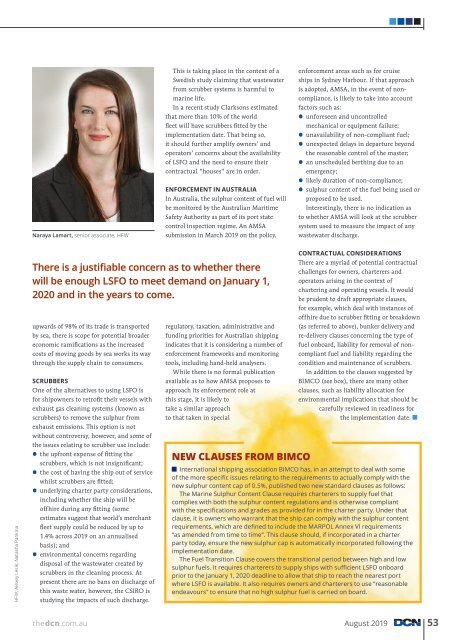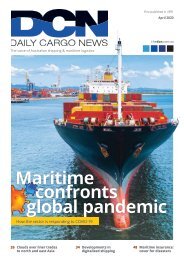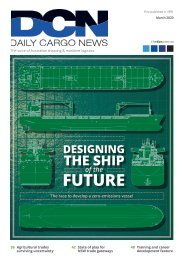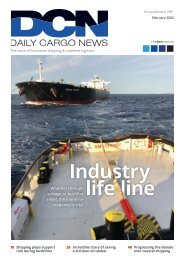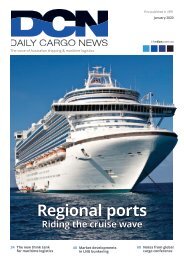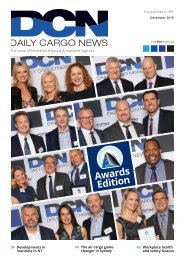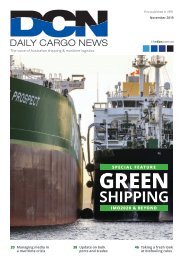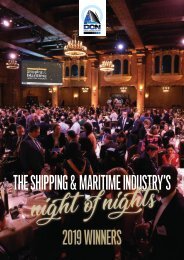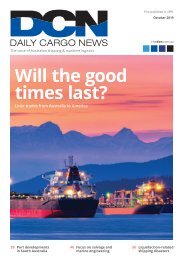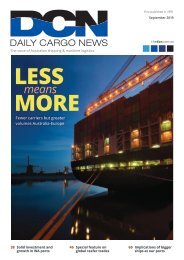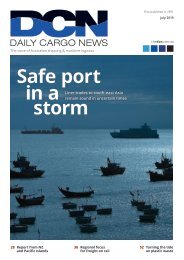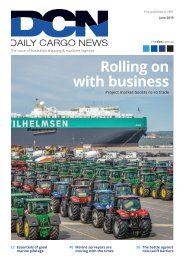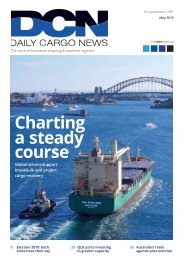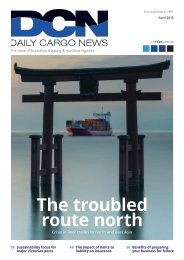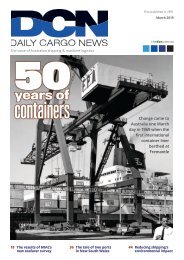DCN AUGUST Edition 2019
Create successful ePaper yourself
Turn your PDF publications into a flip-book with our unique Google optimized e-Paper software.
Naraya Lamart, senior associate, HFW<br />
This is taking place in the context of a<br />
Swedish study claiming that wastewater<br />
from scrubber systems is harmful to<br />
marine life.<br />
In a recent study Clarksons estimated<br />
that more than 10% of the world<br />
fleet will have scrubbers fitted by the<br />
implementation date. That being so,<br />
it should further amplify owners’ and<br />
operators’ concerns about the availability<br />
of LSFO and the need to ensure their<br />
contractual “houses” are in order.<br />
ENFORCEMENT IN AUSTRALIA<br />
In Australia, the sulphur content of fuel will<br />
be monitored by the Australian Maritime<br />
Safety Authority as part of its port state<br />
control inspection regime. An AMSA<br />
submission in March <strong>2019</strong> on the policy,<br />
enforcement areas such as for cruise<br />
ships in Sydney Harbour. If that approach<br />
is adopted, AMSA, in the event of noncompliance,<br />
is likely to take into account<br />
factors such as:<br />
• unforeseen and uncontrolled<br />
mechanical or equipment failure;<br />
unavailability of non-compliant fuel;<br />
• unexpected delays in departure beyond<br />
the reasonable control of the master;<br />
• an unscheduled berthing due to an<br />
emergency;<br />
likely duration of non-compliance;<br />
• sulphur content of the fuel being used or<br />
proposed to be used.<br />
Interestingly, there is no indication as<br />
to whether AMSA will look at the scrubber<br />
system used to measure the impact of any<br />
wastewater discharge.<br />
HFW; Alexey Lesik; Natasha Pankina<br />
There is a justifiable concern as to whether there<br />
will be enough LSFO to meet demand on January 1,<br />
2020 and in the years to come.<br />
upwards of 98% of its trade is transported<br />
by sea, there is scope for potential broader<br />
economic ramifications as the increased<br />
costs of moving goods by sea works its way<br />
through the supply chain to consumers.<br />
SCRUBBERS<br />
One of the alternatives to using LSFO is<br />
for shipowners to retrofit their vessels with<br />
exhaust gas cleaning systems (known as<br />
scrubbers) to remove the sulphur from<br />
exhaust emissions. This option is not<br />
without controversy, however, and some of<br />
the issues relating to scrubber use include:<br />
• the upfront expense of fitting the<br />
scrubbers, which is not insignificant;<br />
• the cost of having the ship out of service<br />
whilst scrubbers are fitted;<br />
• underlying charter party considerations,<br />
including whether the ship will be<br />
offhire during any fitting (some<br />
estimates suggest that world’s merchant<br />
fleet supply could be reduced by up to<br />
1.4% across <strong>2019</strong> on an annualised<br />
basis); and<br />
• environmental concerns regarding<br />
disposal of the wastewater created by<br />
scrubbers in the cleaning process. At<br />
present there are no bans on discharge of<br />
this waste water, however, the CSIRO is<br />
studying the impacts of such discharge.<br />
regulatory, taxation, administrative and<br />
funding priorities for Australian shipping<br />
indicates that it is considering a number of<br />
enforcement frameworks and monitoring<br />
tools, including hand-held analysers.<br />
While there is no formal publication<br />
available as to how AMSA proposes to<br />
approach its enforcement role at<br />
this stage, it is likely to<br />
take a similar approach<br />
to that taken in special<br />
NEW CLAUSES FROM BIMCO<br />
CONTRACTUAL CONSIDERATIONS<br />
There are a myriad of potential contractual<br />
challenges for owners, charterers and<br />
operators arising in the context of<br />
chartering and operating vessels. It would<br />
be prudent to draft appropriate clauses,<br />
for example, which deal with instances of<br />
offhire due to scrubber fitting or breakdown<br />
(as referred to above), bunker delivery and<br />
re-delivery clauses concerning the type of<br />
fuel onboard, liability for removal of noncompliant<br />
fuel and liability regarding the<br />
condition and maintenance of scrubbers.<br />
In addition to the clauses suggested by<br />
BIMCO (see box), there are many other<br />
clauses, such as liability allocation for<br />
environmental implications that should be<br />
carefully reviewed in readiness for<br />
the implementation date.<br />
International shipping association BIMCO has, in an attempt to deal with some<br />
of the more specific issues relating to the requirements to actually comply with the<br />
new sulphur content cap of 0.5%, published two new standard clauses as follows:<br />
The Marine Sulphur Content Clause requires charterers to supply fuel that<br />
complies with both the sulphur content regulations and is otherwise compliant<br />
with the specifications and grades as provided for in the charter party. Under that<br />
clause, it is owners who warrant that the ship can comply with the sulphur content<br />
requirements, which are defined to include the MARPOL Annex VI requirements<br />
“as amended from time to time”. This clause should, if incorporated in a charter<br />
party today, ensure the new sulphur cap is automatically incorporated following the<br />
implementation date.<br />
The Fuel Transition Clause covers the transitional period between high and low<br />
sulphur fuels. It requires charterers to supply ships with sufficient LSFO onboard<br />
prior to the January 1, 2020 deadline to allow that ship to reach the nearest port<br />
where LSFO is available. It also requires owners and charterers to use “reasonable<br />
endeavours” to ensure that no high sulphur fuel is carried on board.<br />
thedcn.com.au August <strong>2019</strong> 53


